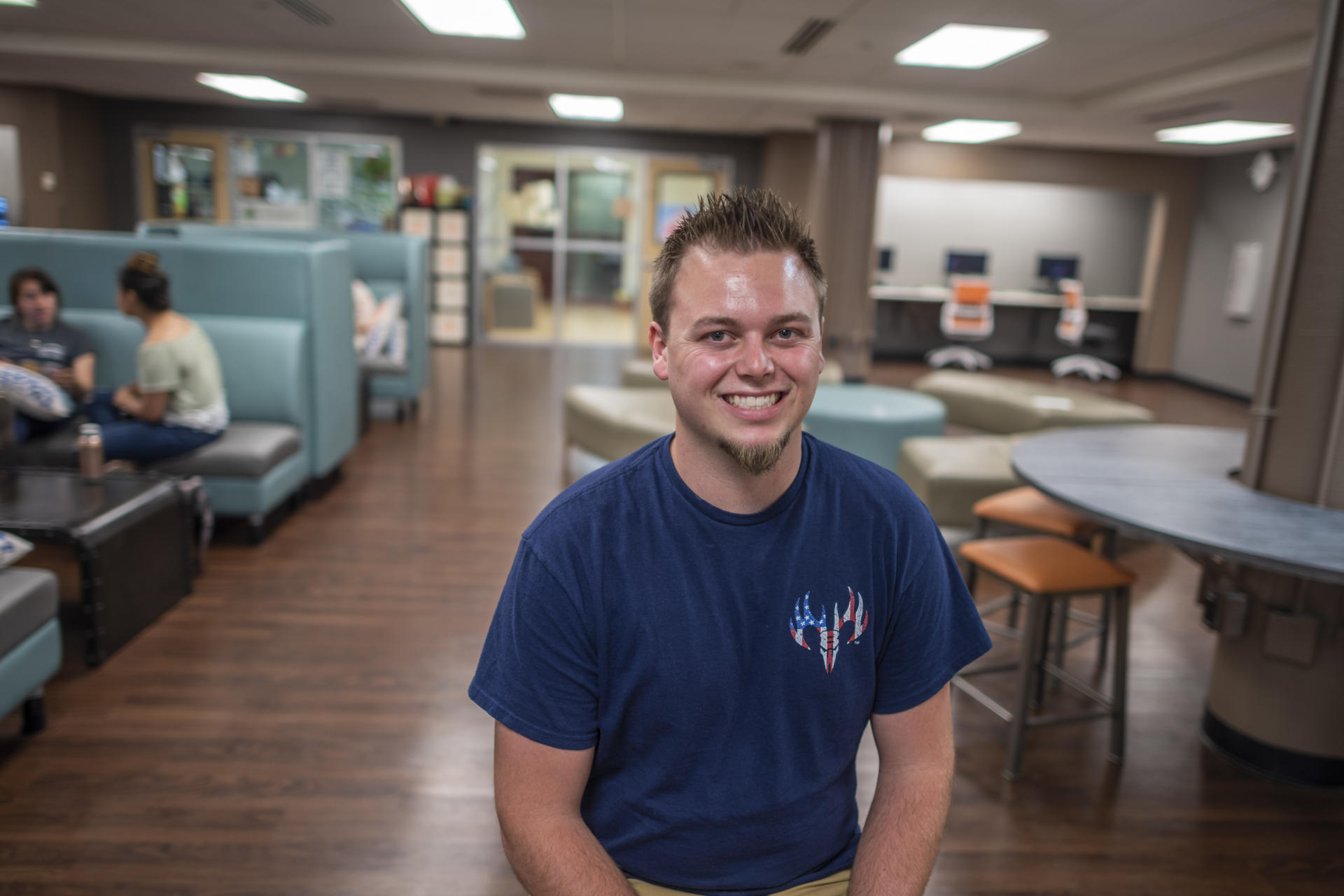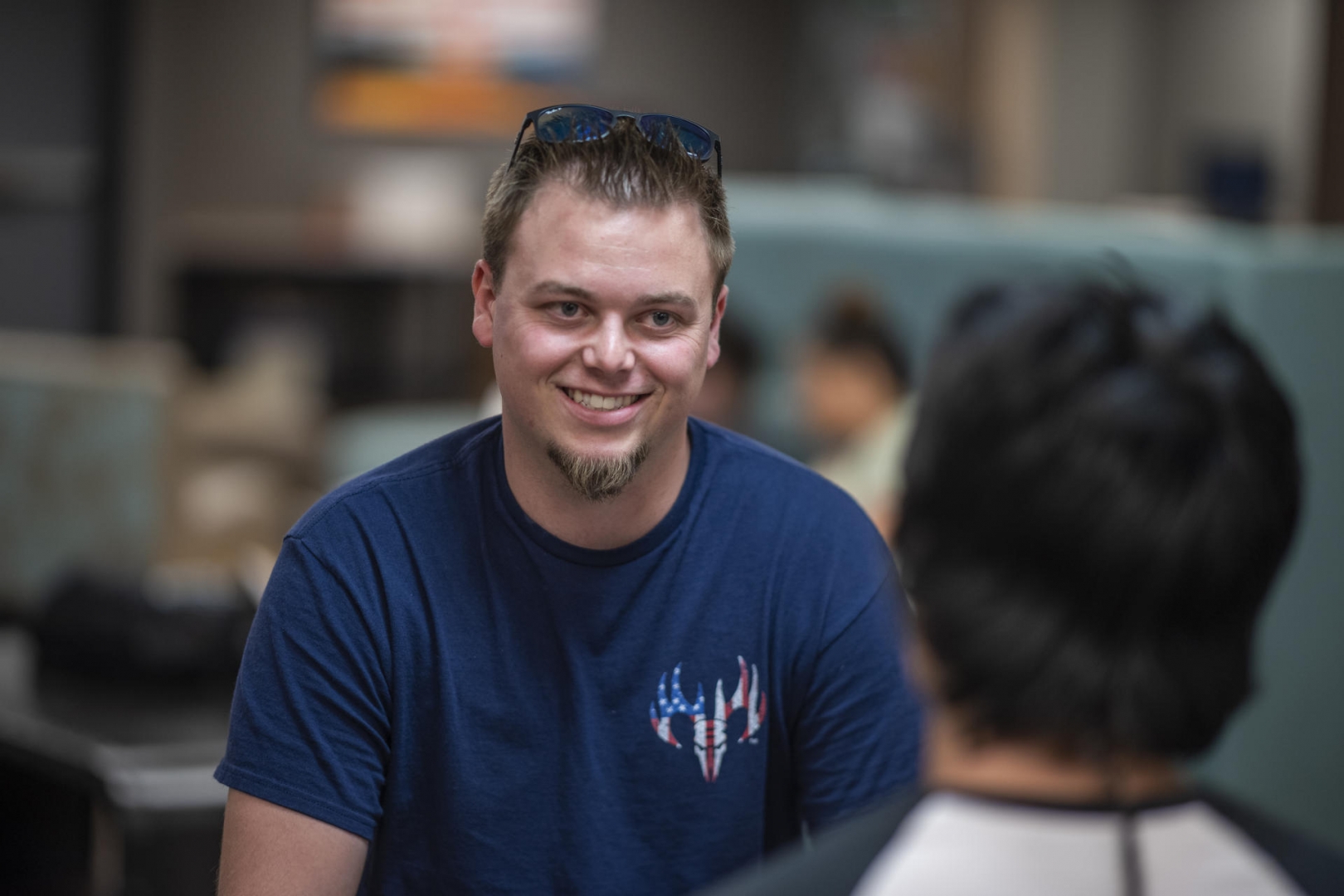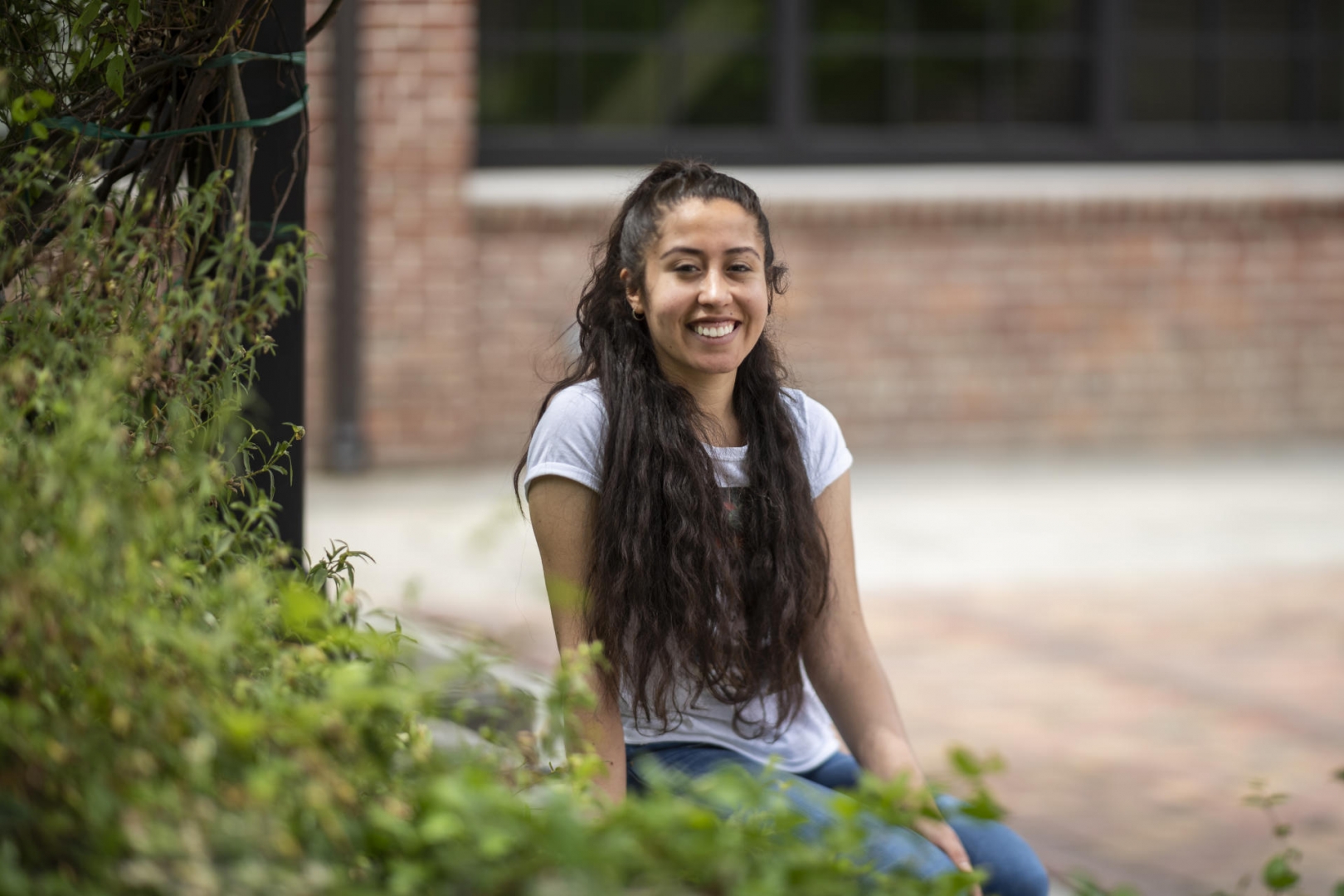Chico State Students Help with Project Restore Success

Luke LaPlant is a Chico State student taking part in Project Restore and is mentoring a youth from Tehama County on Thursday, May 9, 2019 in Chico, Calif. (Jason Halley/University Photographer/CSU Chico)
An uneasy silence fills the space between the two young men. Questions are brief, answers guarded, eye contact fleeting. Like many teenage boys, especially those on the cusp of adulthood, small talk can be a standoff, of sorts, while intuiting intentions.
Criminal justice major Luke LaPant is figuring out how to bridge the chasm to connect with 15-year-old Edgar*. LaPant, a rising sophomore not much older than Edgar, remembers one thing teenage boys generally crave, and on their next visit it helps leads the youth to lower his defenses.
“I got him some BK,” LaPant said, smiling at the thought of their shared burgers, “and he started to open up.”
In the weeks that followed, they talked a lot about choices in life and Edgar began considering turning his passion for art into more than a hobby. He even shared an aspiration to complete an unfinished public mural in Tehama County.
As a mentor for Project Restore, a Red Bluff-based agency that connects mentors with youth in the Tehama County criminal justice system, LaPlant is gaining insight into a side of criminal justice that no textbooks could teach him. And through his volunteerism, he has helped demonstrate that Chico State students can be a valuable resource to the nonprofit and the community it serves.
Funded by Proposition 47, Project Restore explores youth-committed crime from multiple angles in an effort to lower recidivism rates: What does the child’s home life look like? Do they need alcohol or drug counseling? Could therapy also help? And how might a mentor help them navigate it all?

Instead of administering punishment befitting a crime, this “restorative justice” model looks at all parties affected by crime, said program coordinator Gary Fortenberry, and represents a major paradigm shift.
“We look at the community, the victim, and the offender, and we try to restore all of those pieces,” he said. “Where we were just punishing the offender in our old system, this is a more holistic approach.”
“Yes, the kid needs consequences,” Fortenberry continued, “but they also need a positive role model in their life who can advocate for them, encourage them, and go on the journey with them.”
For the last three semesters, Chico State has become a great source for mentors. Project Restore staff have visited criminal justice classes to recruit student volunteers, although the role is open to all majors. Once a student commits to be a mentor for the semester, they are paired with youth by gender and similar interests. Chico State students can receive up to 3 units for their participation, and about 10 students sign up each academic year.
A mentor might accompany their youth to court. They may visit culturally relevant sites, like a museum, to give the youth a completely new experience. Or they could walk around a college campus, like Shasta College, Butte College, or even Chico State, to bust higher education myths the youth may have.
In week six, mentors introduce a “smart goal,” an achievable, realistic, and time-sensitive objective they can help the youth achieve within the 18-week program. It can be anything, such as better grades, getting more exercise, or reading more books.
Since its founding in 2017, Project Restore has helped curtail cycles of crime and addiction in Tehama County. Fortenberry reports a recidivism rate of 8 percent for youth in his program, compared to a rate of approximately 40 percent for probationary youth of the same age and risk level throughout California. A large part of that, he believes, is the connection they are making with their mentors.

With a quiet thoughtfulness and warm, calming demeanor, Angela Serrano (Criminal Justice, ’19) first applied to be a mentor her sophomore year—but she needed a vehicle and didn’t have one. So, during her sophomore and junior years, she worked at Sutter Dining to save for the car to commute to Tehama County once a week.
When Serrano was matched this year, she learned her youth had stopped meeting with her previous mentor because they simply didn’t connect.
“I thought, ‘What if she doesn’t like me, what if she doesn’t show up anymore?’” Serrano said.
As it turned out, she and 16-year-old Julia* hit it off immediately. Their bonds only strengthened over time, leading to milestones for the teen, including academic improvements, a blossoming relationship with her mother, and meeting her goal, which was obtaining her driver’s license, getting a car, and landing a job.
Serrano became a Project Restore mentor for very personal reasons. She’s originally from the low-income community of South El Monte, about 10 miles southwest of Pasadena. As the home of the notorious El Monte Flores gang, the largest Hispanic gang in the San Gabriel Valley, education is not a high priority for the city’s families and children, she said—instead, it’s “learning to survive the gang violence, shootings, and school killings.”
“In high school, we were taught that we could only be good enough to get as far as working at McDonald’s,” Serrano added. “No one talked about college or taught us how to get there.”
So when Serrano enrolled at Chico State, she seized the opportunity to distance herself from her hometown violence. She focused on her education and how to help her hometown youth.
“My dream became to learn as much I could so I can go back to my own city and figure out a way to help the youth there, by showing them that gangs and McDonald’s are not the only things out there in this world,” Serrano said. “These children are bright and full of talent and passion. But since we are a low-income community where gang violence is very common, people stop believing in us and the things we are capable of doing.”
While Project Restore changes lives, challenges remain. For the program to be successful, the youth must buy into the program and into their assigned mentor, which isn’t always easy. Mentors, too, struggle with the program when it’s not a right fit.
Sarah Smith, faculty in the Department of Political Science and Criminal Justice and an on-campus liaison for Project Restore, said the biggest challenge is getting male students to sign up and commit to being mentors.
“We usually have an overflow of women who [mentor], but there are many more boys in the juvenile justice system or who have been arrested,” Smith said, leaving lots of male youth waiting for mentors.
Challenges aside, Project Restore has met with tremendous success. Fortenberry said he is looking for ways to expand its service to transitional-age youth and hopes Chico State will continue to be a partner.
“A lot of these kids that age out of our program at 18 don’t have anything,” he said. “They don’t have any support or anyone following through to see if they got to college. This would be a way to help get them signed up for college, get housing, and get jobs.”
As Serrano enters a new stage in her life as a college graduate, she’s preparing for a two-year appointment with the Peace Corps in Rwanda. Despite the distance, she and Julia still plan to stay connected and she hopes to be an inspiration for the opportunities education can provide.
“She said, ‘Wherever you go, send me pictures,’” Serrano said. “Even though the program is over, I’m still here for whatever she needs.”
And despite completing his 18-week commitment with his youth last month, LaPlant also looks forward to continuing his work with Project Restore.
“As long as I have time and live in Chico,” LaPant said, “I will continue to work with the program and help these young people.”
*Names of the Project Restore youth participants have been changed to protect their privacy.


